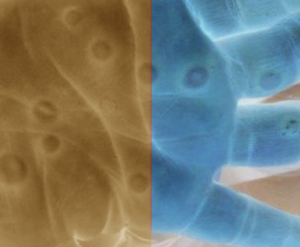Vaccination is effective in limiting mpox progression – but lower efficacy in people living with HIV
27 May 2025. Related: Journal scan, mpox.
Simon Collins, HIV i-Base
 Results from a prospective case-control study of 4069 cisgender gay and bisexual men in California (from May 2022 to December 2023) reported reduced clinical progression and hospitalisation in people who received mpox vaccination, although rates were lower in people living with HIV. [1]
Results from a prospective case-control study of 4069 cisgender gay and bisexual men in California (from May 2022 to December 2023) reported reduced clinical progression and hospitalisation in people who received mpox vaccination, although rates were lower in people living with HIV. [1]
Overall, the JYNNEOS mpox vaccination reduced progression of lesions by 59% (95% CI: 50 to 66) and hospitalisation by 85% (95% CI: 54 to 95).
The study was based on data in case report forms completed after telephone interviews in people with a laboratory-confirmed positive mpox diagnosis. Cases (n=3043, with 2715 unvaccinated) were defined by disseminated lesions, and controls (n=1566 with 1135 unvaccinated) by lesions in only one body site.
In people living with HIV, progression was reduced by 45% (95% CI: 27 to 58) compared to 67% (95% CI: 57 to 74) in participants without HIV. However, protection was only apparent in people with CD4 counts >350 cells/mm3. Overall, 47% vs 34% of cases vs controls were people living with HIV, but this only included 201 people who had a CD4 count <350 cells/mm3. Positive HIV status however was associated with higher risk of progression and hospitalisation irrespective of vaccination status.
Although the main study only reported efficacy in cisgender participants due to low numbers, 6% of mpox cases were in women and gender minority populations.
A related editorial commented on the continued lack of randomised data on vaccine efficacy (against both clades 1 and 2), limited data of durability of protection (which is likely to wane, especially in people living with HIV), and global inequity of access to vaccines. [2]
It also included the limited data on the durability of vaccine protection as the median time from vaccination to first symptoms was 47 days (IQR: 28 to 318). [1]
Several studies have already reported that protection is likely to wane, especially in people living with HIV who should receive a booster after two years. [3]
References
- Granskog K et al. Effect of JYNNEOS vaccination on mpox clinical progression: a case-control study. Lancet Infect Dis. (21 May 2025).
https://www.thelancet.com/journals/laninf/article/PIIS1473-3099(25)00180-X/fulltext - Marks M and Mitjà O. Mpox vaccines attenuate disease—but evidence and equity gaps remain. (21 May 2025).
https://www.thelancet.com/journals/laninf/article/PIIS1473-3099(25)00282-8/fulltext - >Moraes-Cardoso I et al. Immune responses associated with mpox viral clearance in men with and without HIV in Spain: a multisite observational prospective cohort study. Lancet Microbe, 5(8):100859. (August 2024).
https://www.thelancet.com/journals/lanmic/article/PIIS2666-5247(24)00074-0/fulltext - People living with HIV need two shots of the mpox vaccine and likely a booster after two years. HTB (April 2025).
i-base.info/htb/50751

